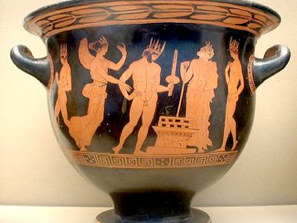
BLOG

Ode: On a Grecian Urn
Sunday, August 21, 2011
THOU still unravish'd bride of quietness,
Thou foster-child of Silence and slow Time,
Sylvan historian, who canst thus express
A flowery tale more sweetly than our rhyme:
What leaf-fringed legend haunts about thy shape
5
Of deities or mortals, or of both,
In Tempe or the dales of Arcady?
What men or gods are these? What maidens loth?
What mad pursuit? What struggle to escape?
What pipes and timbrels? What wild ecstasy?
10
Heard melodies are sweet, but those unheard
Are sweeter; therefore, ye soft pipes, play on;
Not to the sensual ear, but, more endear'd,
Pipe to the spirit ditties of no tone:
Fair youth, beneath the trees, thou canst not leave
15
Thy song, nor ever can those trees be bare;
Bold Lover, never, never canst thou kiss,
Though winning near the goal—yet, do not grieve;
She cannot fade, though thou hast not thy bliss,
For ever wilt thou love, and she be fair!
20
Ah, happy, happy boughs! that cannot shed
Your leaves, nor ever bid the Spring adieu;
And, happy melodist, unwearièd,
For ever piping songs for ever new;
More happy love! more happy, happy love!
25
For ever warm and still to be enjoy'd,
For ever panting, and for ever young;
All breathing human passion far above,
That leaves a heart high-sorrowful and cloy'd,
A burning forehead, and a parching tongue.
30
Who are these coming to the sacrifice?
To what green altar, O mysterious priest,
Lead'st thou that heifer lowing at the skies,
And all her silken flanks with garlands drest?
What little town by river or sea-shore,
35
Or mountain-built with peaceful citadel,
Is emptied of its folk, this pious morn?
And, little town, thy streets for evermore
Will silent be; and not a soul, to tell
Why thou art desolate, can e'er return.
40
O Attic shape! fair attitude! with brede
Of marble men and maidens overwrought,
With forest branches and the trodden weed;
Thou, silent form! dost tease us out of thought
As doth eternity: Cold Pastoral!
45
When old age shall this generation waste,
Thou shalt remain, in midst of other woe
Than ours, a friend to man, to whom thou say'st,
'Beauty is truth, truth beauty,—that is all
Ye know on earth, and all ye need to know.'
50
Keats was looking at a pot like the one pictured above, and the Ode is just really a one way conversation between him and the people pictured on the pot. That one-way conversation technique is called “apostrophe.”No, it has nothing to do with little hooky jobber punctuation.
So it sounds like a virgin is being chased by some guy who wants to kiss her. In fact, maybe a bunch of virgins are being chased by a bunch of guys. They’re in a forest, a “Sylvan” setting. There’s a band! People are playing pan pipes and tambourines. Toga party!
Keats thinks this frozen moment of the picture might be better than a real life party. He can imagine better music than the real thing. It will always be summer in this forest where the guy will always be passionate for the girl who will always by pretty. He’s right! Think about movie kisses. The events leading up to the kiss are always more interesting than the kiss itself.
In “Chinatown” the moment before Jack Nicholson kisses Faye Dunaway is electric. Then they basically break each other’s jaws.
The operant word in this stanza is “cloy’d.” When you have had too much of a sweet thing, it has cloyed. So the music, the Springtime, the romance and the anticipation that makes this toga party great will never get old.
What the heck is this stanza doing in this poem?
I guess there’s a bunch of people leaving a town to sacrifice a cow in another scene on the urn, but that has nothing to do with all the panting and passion in the first scene. I wish Keats would have omitted this.
Now he’s talking to the whole urn. He thinks it’s cool that future people will look on the same urn and be inspired.
Is beauty truth? Can’t people be blinded by beauty? Is truth beauty? I mean, if someone says, “You’re ugly,” that might be the truth, but it wasn’t a beautiful thing to say. Maybe the truth he loves is that people will always have wild passionate moments. That’s beautiful.
